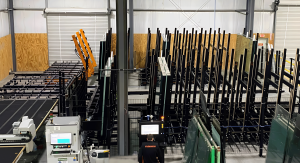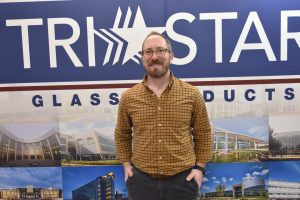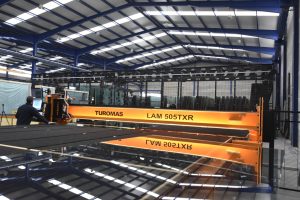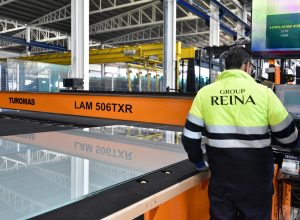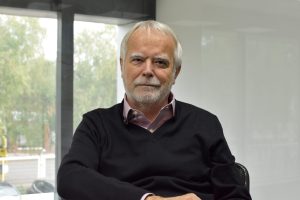Covipor reinforces its production capacity with TUROMAS technology.
Covipor, a company specialising in the transformation and distribution of flat glass for the civil construction sector, has once again relied on TUROMAS technology to renovate its industrial park and adapt to new market requirements.
Since its founding in 1951 and its subsequent acquisition by the Saint-Gobain Group in 1989, Covipor has experienced continuous growth. In 2023, the company was acquired by Vanguard Properties, marking the beginning of a new phase focused on improving processes and adopting advanced technology to meet market demands.
A commitment to efficiency and quality
Covipor’s commitment to customer satisfaction is one of its fundamental pillars. Its strategy focuses on offering products that meet expectations in terms of quality, delivery times, function and price. To this end, the company has implemented improvements in its production capacity, starting with the updating of its glass cutting lines with the latest TUROMAS technology.
Covipor has a sustainability policy that encompasses both the reduction of the environmental impact of its activity and the optimisation of its industrial processes. TUROMAS machines allow Covipor to improve cutting precision and reduce energy consumption, in line with its sustainability and efficiency objectives.
The renovation of Covipor’s industrial park includes the installation of TUROMAS equipment such as the LAM 505 (2010), the LAM 505 TXR with RUBI 406 C (2022) and the latest RUBI 406 C (2024). These machines have been selected not only for their technological capacity, but also for the trust that Covipor places in the technical support and reliability that TUROMAS offers.
Interview with Covipor:
- What is COVIPOR? Explanation about COVIPOR (history, structure, vision and values of the company, presence in the world, core business, company philosophy, processes, customers, etc.).
With two transformation centres, located in the Greater Porto area, Covipor is a company specialised in the transformation and distribution of flat glass, mainly for the civil construction market.
The company’s history begins in 1951, with the foundation of VIDROS SEGURANÇA, LDA. Later, in 1972, VIDRONORTE, LDA was created, consolidating its presence in the glass processing sector in Portugal. In 1989, VIDRONORTE was acquired by the renowned Saint-Gobain Group, marking the beginning of a new phase of growth.
In 2001, the two companies belonging to the group merged to operate under the name of Covipor. In 2004, the Santo Tirso industrial unit was expanded, reinforcing the company’s production capacity.
More recently, in 2023, Vanguard Properties acquired Covipor, initiating a new stage in its history.
It incorporates in its industrial process all glass transformation processes, from cutting (monolithic or laminated), manufacturing processes, screen printing, tempering and Heat Soak testing, laminating and double glazing.
Our main objective is customer satisfaction, so it is essential that our services and products fully meet customer expectations in terms of function, price, delivery time and quality.
We are concerned about sustainability and, in this regard, we aim to reduce the undesirable environmental effects resulting from our activity by adopting appropriate preventive and emergency measures, as well as a policy of recycling all the products we use, through partnerships.
We encourage our employees to develop and apply all their skills in the performance of their daily activities safely, respecting the environment and their physical integrity. We believe that commitment, training and teamwork are essential for better results.
It is our commitment to consult and encourage the participation of our collaborators in the Health and Safety at Work policy, in order to adapt and promote actions to improve personal and collective development.
COVIPOR’s objective is the continuous satisfaction of the needs of Clients, Collaborators, Society and Shareholders, as well as the search for the continuous improvement of Products, Processes, Methodologies, Environmental Protection, Safety and Quality System.
We believe that Technical Knowledge, Customer Support and the Know-how of our employees are the fundamental pillars for carrying out COVIPOR’s Mission.
- How did the need for the new TUROMAS cutting machines arise?
This need is due to some fundamental aspects:
1 – Increased cutting capacity: The need to respond to growing market demand requires improvements in productivity, based on increasing the speed of the process, specifically in the speed and accuracy of cutting, as well as in all related operations, allowing us to increase production capacity without increasing costs.
2 – Incorporation of new products and technologies: Glass is a diverse solution for the civil construction sector. The market is constantly evolving, which requires constant adjustments through continuous innovation of transformation processes and optimization of resources. This requires a constant search for new equipment and technologies in glass processing, which implies a continuous investment in industrial equipment.
3 – Increase in the quality of the products supplied: The search for new markets and products has made it necessary to invest in new technologies and equipment to meet customer expectations.
4 – Energy saving: Covipor’s concern for sustainability, evident in its environmental concerns, also covers the economic aspect, which leads us to a constant review of industrial processes to reduce energy consumption, reduce costs and promote the sustainability of the company.
5 – After-sales service: When investing in new equipment, after-sales technical support is essential. Since the first equipment purchased by Covipor, the technical support, the human relations and the reliability of the different components give us the confidence to continue investing in Turomas.
- Which TUROMAS machine models have been installed? Why are these machines the best for COVIPOR? What would you highlight about them?
We have installed: LAM 505 (2010); LAM 505 TXR with RUBI 406 C (2022); and RUBI 406 C (2024).
As already mentioned, the need to renew the industrial park, adapting to new technologies, both in terms of products and glass transformation processes, led us to renovation, starting with cutting, which is where it all begins.
If I had to highlight one characteristic, I would say: Reliability.
